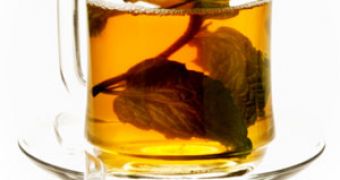Green tea is highly popular in various diets for its effect of hampering the hunger sensation. But its qualities go much further. Its antioxidant called EGCG (epigallocatechin-3- gallate) impedes the premature aging and harming of the cells. Previous researches had pointed that the green tea could be effective against some cancer types, like breast cancer. A new research made at the University of Mississippi, that will be presented at the 121st Annual Meeting of the American Physiological Society, shows that EGCG consumption stops breast tumor growth in female mice.
The team investigated how drinking EGCG affected the activity of VEGF (vascular endothelial growth factor, encountered in many breast cancer types), tumor angiogenesis (the forming of new blood vessels, which boosts tumor growth) and the growth of breast cancer in female mice. Seven-week-old female mice received EGCG (25 mg/50 ml) in drinking water for five weeks, in a dose of about 50-100 mg/kg/day. In the second week of the trial, the females were injected with mouse breast cancer cells in the left fourth mammary glands.
Tumor size was observed by determining the tumor cross section area (TCSA). The tumors were finally removed and weighed. The team also investigated intratumoral microvessel (IM) density and VEGF levels.
Five weeks later, the scientists discovered that EGCG consumption provoked a drop in TCSA (66%), tumor weight (68%), IM density (by 40%) and VEGF levels (by 29%) in the breast tumors vs. the control mice. VEGF plasma levels were decreased in EGCG mice compared to control mice by 54%.
"The reason for the link between EGCG and the reductions in the cancer data was because EGCG directly targets both tumor blood vessels and tumor cells of breast cancer for suppressing the new blood vessels formation in breast tumor, the proliferation and migration of breast cancer cells. In this study we have demonstrated that the frequent ingestion of EGCG significantly inhibits breast tumor growth, VEGF expression and tumor angiogenesis in mice. We believe our findings will help lead to new therapies for the prevention and treatment of breast cancer in women," said senior author Dr. Jian-Wei Gu, of the Department of Physiology & Biophysics, University of Mississippi Medical Center, Jackson, MS.

 14 DAY TRIAL //
14 DAY TRIAL //